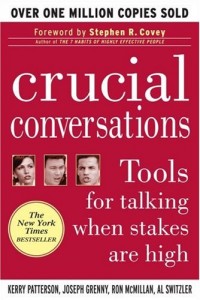This is the third in a series of articles on the importance of dialogue as the basis of Significant Conversations: Evangelism that resonates with our Canadian context. The first two articles provided theoretical support for dialogue, in contrast to proclamation, as a valid and effective method of evangelism for our Canadian context. This article introduces practical steps towards developing skills that lead to productive and healthy dialogue. Mark provides Significant Conversations coaching to FEB churches with the goal of developing local church based support networks that encourage, equip and empower people to converse in contextually sensitive ways about the values and beliefs that shape our lives.
Going Beyond Fight or Flight
 The setting was Pakistan in the early 90s. I was having a problem with our visas and went to the capital city, Islamabad, to sort out the difficulty. As I entered the government office, I was taken aback to find it crowded with close to 10 North American young people. They had obviously been on some type of spiritual quest and had embraced the practices of an eastern mystic. Rather than using the chairs they were sitting cross-legged on the floor, playing instruments and chanting. The office staff was doing their best to ignore them, but they did not seem terribly pleased at the abrasive stance and non-conformist actions of the young people. One of the young women studied me for a bit and concluded, correctly, that I was a western missionary. She then loudly commented to one of her comrades, “Christians are so hypocritical. The Bible says, ‘Thou shalt not kill,’ but they ignore that command and kill cows and eat them.”
The setting was Pakistan in the early 90s. I was having a problem with our visas and went to the capital city, Islamabad, to sort out the difficulty. As I entered the government office, I was taken aback to find it crowded with close to 10 North American young people. They had obviously been on some type of spiritual quest and had embraced the practices of an eastern mystic. Rather than using the chairs they were sitting cross-legged on the floor, playing instruments and chanting. The office staff was doing their best to ignore them, but they did not seem terribly pleased at the abrasive stance and non-conformist actions of the young people. One of the young women studied me for a bit and concluded, correctly, that I was a western missionary. She then loudly commented to one of her comrades, “Christians are so hypocritical. The Bible says, ‘Thou shalt not kill,’ but they ignore that command and kill cows and eat them.”
She was obviously throwing out a challenge that was directed at me. I considered the dilemma: Should I respond and correct the misunderstanding evident in her remark, or should I remain silent? I concluded that she was looking for an argument and, therefore, any response to address her error would only result in conflict and a verbal battle. As a result, I remained silent and let the statement pass unchallenged. But were these the only two options at my disposal? Was there a third way of addressing the challenge that could have led to constructive and healthy dialogue?
 Canadian Christians live in an environment in which many of our values and beliefs are contradicted and challenged. All of us have been faced with similar dilemmas while talking to colleagues and friends, when values and beliefs are expressed that we view as destructive and false. Do we challenge what is said and risk alienating people, or do we keep silent? Fortunately, there is another option. Rather than viewing such expressions as challenges to our faith or as errors to be corrected, we can develop skills that allow us to use these incidents as invitations to dialogue and opportunities to engage in Significant Conversations. Rather than a defensive posture that results in flight (silence) or fight (contradiction and argument),1 there is a third way that leads to constructive, enjoyable and open conversations in which all participants can express their views in an atmosphere of respect. But this doesn’t happen by accident. Skills need to be learned and practiced.
Canadian Christians live in an environment in which many of our values and beliefs are contradicted and challenged. All of us have been faced with similar dilemmas while talking to colleagues and friends, when values and beliefs are expressed that we view as destructive and false. Do we challenge what is said and risk alienating people, or do we keep silent? Fortunately, there is another option. Rather than viewing such expressions as challenges to our faith or as errors to be corrected, we can develop skills that allow us to use these incidents as invitations to dialogue and opportunities to engage in Significant Conversations. Rather than a defensive posture that results in flight (silence) or fight (contradiction and argument),1 there is a third way that leads to constructive, enjoyable and open conversations in which all participants can express their views in an atmosphere of respect. But this doesn’t happen by accident. Skills need to be learned and practiced.
Developing Skills to Talk about Significant Issues
 In their book Crucial Conversations: Tools for Talking When Stakes Are High, Patterson et al. provide both the theory and practical application required to engage in effective and relationship-strengthening conversations when “opinions vary, stakes are high and emotions run strong.”2 Their book is based on years of research during which they discovered the skills used by influential people who are able to speak into volatile situations so that respectful and positive dialogue results. In this article, I will apply some of those key principles and skills to the uncomfortable arena of conflicting values and beliefs. By learning how to face such challenges with grace and confidence, they can be transformed into positive and significant conversations, conversations in which our faith in Christ becomes evident.
In their book Crucial Conversations: Tools for Talking When Stakes Are High, Patterson et al. provide both the theory and practical application required to engage in effective and relationship-strengthening conversations when “opinions vary, stakes are high and emotions run strong.”2 Their book is based on years of research during which they discovered the skills used by influential people who are able to speak into volatile situations so that respectful and positive dialogue results. In this article, I will apply some of those key principles and skills to the uncomfortable arena of conflicting values and beliefs. By learning how to face such challenges with grace and confidence, they can be transformed into positive and significant conversations, conversations in which our faith in Christ becomes evident.
The phrase “opinions vary, stakes are high and emotions run strong,” is an appropriate description of the tension and conflict that can arise when we face issues (such as current sexual practices) that are in stark contrast with our convictions. In this case “opinions vary” refers to a clash in values. When an uncomfortable value challenges our belief system and the way we live our lives, then the “stakes are high,” and we are prompted to defend our perspective. However, confronting the issue can result in “strong emotions” that threaten existing relationships and lead to defensiveness and heated arguments.
conflicting values and beliefs [are] invitations
Patterson et al. point out that in such situations we can do one of three things: “we can avoid them, we can face them and handle them poorly, or we can face them and handle them well.”3 Avoidance means that we will lose the opportunity to develop a relationship on a deeper level. Handling these situations poorly is probably even more harmful than avoidance because of the damage done to relationships. However, if we recognize these situations as invitations that can lead to non-threatening and thoughtful conversations, and then respond with the right skills, we can encourage positive dialogue that will lead to, not only hearing the concerns of others, but sharing our own Christian perspective.
The following example outlines one of the skills from Crucial Conversations that can be used to generate healthy and effective dialogue.
The ABCs of generating positive dialogue
 I have a tendency to express disagreement with comments that I don’t think are right. This is not helpful when the goal is to stimulate dialogue. By immediately disagreeing (and I am trying hard to overcome this obnoxious habit), the conversation becomes defined as an argument in which one person wins and the other loses. Fortunately, there is a healthier approach to expressions of values and beliefs that we disagree with. Patterson et al. provide us with the ABCs4 of discussing conflicting opinions without conflict:
I have a tendency to express disagreement with comments that I don’t think are right. This is not helpful when the goal is to stimulate dialogue. By immediately disagreeing (and I am trying hard to overcome this obnoxious habit), the conversation becomes defined as an argument in which one person wins and the other loses. Fortunately, there is a healthier approach to expressions of values and beliefs that we disagree with. Patterson et al. provide us with the ABCs4 of discussing conflicting opinions without conflict:
- Agree: Rather than immediately addressing the point of disagreement, it is more profitable to discipline ourselves to find the areas of agreement. By finding common ground we become cohorts rather than sparring partners.
- Build. Even if we strongly disagree with the value expressed, it is better to phrase our view as a further development based on the area of agreement, rather than a contradiction of the other point of view.
- Compare and contrast. Even when pointing out the difference between our view and the view of our conversation partner, it is helpful not to contradict them. Rather than stating that the other person is wrong, suggest that we differ and compare the two views. This allows both conversation partners to explore the two views together, rather than attacking each other’s perspective.
As an illustration of how a conversation of values can lead to a witness of our faith, suppose a colleague mentions that their daughter is shacking up with her boyfriend, and seems to consider that appropriate behavior. The two tendencies that do not allow the relationship with our colleague to deepen are either silence (not addressing the issue) or violence (indicating disapproval which communicates condemnation). By following the ABC process, a positive outcome is possible:
Agree: “It is true that people living together before marriage is common these days. That is far different than it was a generation ago….” In this way there is agreement, not about the moral issue, but concerning facts that are common to the situation. The topic is introduced in a non-threatening way.
 Build: “Even though some of the relationships do develop to the point of marriage, it worries me that this often leads to weaker relationships and broken homes for children….” This brings out an unspoken issue that may be a concern of the colleague as well.
Build: “Even though some of the relationships do develop to the point of marriage, it worries me that this often leads to weaker relationships and broken homes for children….” This brings out an unspoken issue that may be a concern of the colleague as well.
Compare: “I think we differ in our perspective. You have a pragmatic outlook and hope for the best and want to affirm them in their relationship so that it can be as good as possible. On the other hand, I hold to the sacredness of the marriage covenant as something given to us by God that is essential for a relationship to develop into all that it is intended to be….”5
The Discipline of Dialogue
Developing conversational skills that lead to effective dialogue requires discipline, practice and a willingness to leave the comfort zone of our natural and comfortable response patterns. But when we recognize the potential of these conversations to introduce people to Christ and deepen our own faith, the struggle is worth it. In the following article, skills to control our own emotions as well as practical steps to make a conversation safe for others will be discussed.
Mark spends part of his time coaching churches in Significant Conversations. If you are interested in this method of evangelism, please contact him via the Contact Me form. If you would like to leave a comment, please use the “comment” link at the bottom of this article.
- ____________________
- 1 Patterson, K Grenny, J McMillan, R and Switzler A 2002. Crucial Conversations: Tools for Talking When Stakes Are High. New York: McGraw-Hill, 29.
- 2 ibid., 1-2.
- 3 ibid., 3.
- 4 ibid., 156-158.
- 5 If you have other examples of how this ABC method can be used to stimulate positive dialogue, please let me know via the ‘Click here to comment’ link at the bottom of this article.

I found this article VERY informative and helpful, it will take practise, but oh isn’t it worth it to be able to impart the truth to people instead of not speaking up or argueing with them, thank you for this information. Barb.